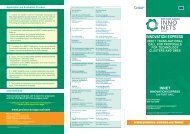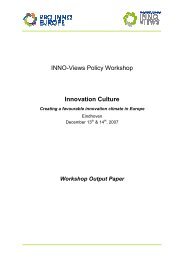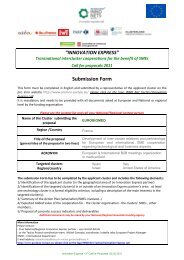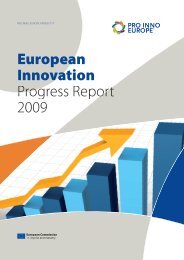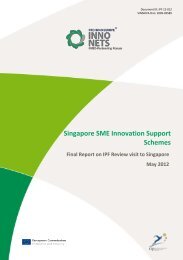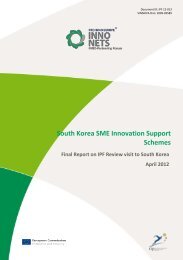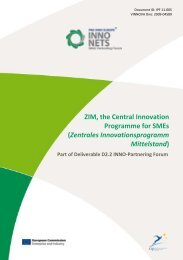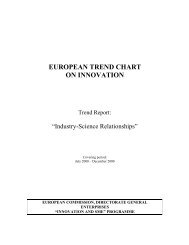Benchmarking National - PRO INNO Europe
Benchmarking National - PRO INNO Europe
Benchmarking National - PRO INNO Europe
You also want an ePaper? Increase the reach of your titles
YUMPU automatically turns print PDFs into web optimized ePapers that Google loves.
Hartung, 2007) may make it easier for SMEs to perform patent scans on their own.<br />
In the meantime, SMEs who decide to use the services of a patent attorney should<br />
make sure that they chose a patent attorney with profound technical and legal<br />
know how in the SME business environment.<br />
Policy makers should be aware that by introducing value-added search services<br />
they may enter the theatre of private services providers (patent attorneys and<br />
others). It appears that public provision of search services has the potential of<br />
conflicting with private-sector provision of these services, but, at the level of the<br />
patent attorney, also offers complementarities. These issues will be dealt with in the<br />
next section.<br />
5.5 The interaction between private and public<br />
support services<br />
The underlying benchmarking study set out to analyse the performance and<br />
effectiveness of the system of public support given to SMEs in the field of IPR on a<br />
national and regional level – private sector offerings were thus not directly<br />
subject to scrutiny. Notwithstanding this, it seems necessary to comment on<br />
existing private services and how they do (or should) interact with public measures.<br />
In this context, it should be first recalled that public intervention should ideally only<br />
be carried out if a market failure can be identified. As has been shown in the<br />
preceding chapters, the existence of a market failure can be argued, as SMEs may<br />
face more barriers in putting their IP to use than large companies.<br />
However, if services offered by the private sector are up the task and meet the<br />
needs of small and medium-sized firms to the full extent, the introduction of public<br />
measures would only lead to unwanted displacement and crowding out effects.<br />
The following discussion relies to a large extent on anecdotal evidence, expert<br />
opinions gathered through the course of the study and some literature sources<br />
(Lagemaat & Frackenpohl, 2005; ACIP, 2003; Ebersole, 2003). As a consequence,<br />
it will not be able to answer the question on an empirically firm basis, as private<br />
service offerings have not been under scrutiny in the scope of the underlying study.<br />
Yet it should provide a starting point for further discussions and analysis.<br />
The private sector of IPR service providers seems to mainly comprise two groups of<br />
professionals/companies: patent attorneys (resp. patent agents) and commercial<br />
patent information providers (which includes companies such as Derwent,<br />
Europatent, INCOM and IFI Claims). These commercial patent information<br />
providers run added-value search services and operate self-designed databases with<br />
patent information. In addition, external business consultants and lawyers may also<br />
play a role when it comes to issues related to marketing/trade marks or general<br />
knowledge management.<br />
93<br />
TOWARDS GOOD PRACTICES – THE REAL WORLD OF IPR SUPPORT SERVICES





